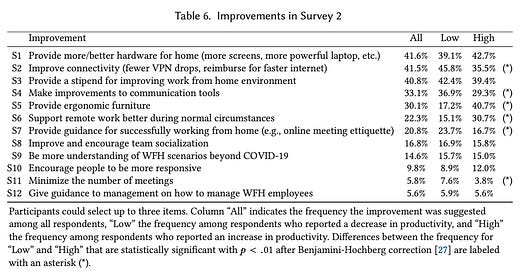RDEL #12: How to improve WFH for software engineers
What lessons can a mandatory stay-at-home order offer about improving the remote work experience more broadly?
Welcome back to RDEL! Each week, we pose an interesting topic in engineering leadership, and apply the latest research in the field to drive to an answer.
🏡 This week, we look at WFH conditions for software engineers and consider the small details that make a big difference on an engineer’s happiness and productivity.
The context:
While working remotely has always been somewhat common in software engineering, the last three years has seen a tremendous jump in the number of remote or hybrid software engineers. This is due largely to COVID-19; after almost two years of mandatory work-from-home, software engineers prefer the flexibility that comes with it. A survey of software engineers last year found that 75% of engineers want to work remote at least three times a week.
With so many software engineers working remotely, how do we create the best conditions for sustained productivity while working from home?
The research:
A team of researchers at Microsoft and University of Victoria teamed up to study how software developers adjusted to working from home shortly after the start of the COVID-19 pandemic. Using two surveys delivered weeks apart, the researchers found a dichotomy of developer experiences as they settled into remote work. The first survey uncovered the main benefits or challenges they faced, and the second survey showed the frequency or impact of those benefits/challenges. (Note: this paper has many insights on benefits and challenges of WFH, but for this week’s RDEL we focus on how to improve WFH conditions. We recommend reading the whole paper!)
One of the primary questions researchers asked was “What recommendations should be made to companies whose engineers wish to work from home?” They analyzed both the prevalence of the suggestions and the impact on productivity.
Notable results include:
The most frequently selected improvement overall were “provide more/better hardware”, followed by “improve connectivity” and “provide a stipend for improving work from home environment”
For engineers who reported an overall decrease in productivity from WFH, the top recommendations were “improve connectivity”, “make improvements to communication tools”, “provide guidance for successfully working from home”, and “minimize the number of meetings”.
For engineers who reported an overall increase in productivity from WFH, the top recommendations were “ergonomic furniture” and “support remote work better during normal circumstances”. Researchers posit these results may be because these engineers are already satisfied with other potentially pressing needs.
The application:
The paper offers a few tangible ways to improve WFH conditions for software engineers. Recommendations include:
A connectivity stipend: Connectivity is an important requirement for software engineers, and not always guaranteed in a home environment. Providing a stipend for internet is a simple and effective way to guarantee bandwidth for both coding work and video calls.
A WFH environment stipend: For both better hardware and ergonomic support, a $500-$1000 WFH stipend gives engineers an environment that mimics the setup they would have in an office.
Create blocks of “deep work” time: Engineers require sustained periods of no interruptions to be able to accomplish deep work. In any environment, but especially remotely (where there are fewer visual signals of an engineer being busy), the consequence of frequent slack pings and meetings is that limited deep work gets done. Consider auditing meetings on the engineering team’s calendar, as well as advocating for afternoon calendar blocks for engineers (with notification snoozing).
With these tips, you can create a sustained WFH environment that allows engineers to maintain - or improve - productivity and reap the benefits of a more flexible work schedule. Thanks again for reading this week, and happy Research Monday!
—
Lizzie
From the Quotient team




